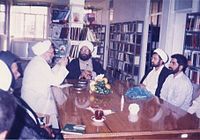- Grand Ayatollah Muhammad Hussain Najafi
-
Muhammad Hussain Najafi
محمد حسین النجفي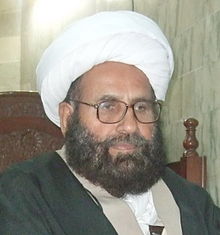
Religion Usuli Twelver Shi`a Islam Other name(s) Arabic/Persian/Punjabi/Urdu: محمد حسین نجفی Personal Born April 10, 1932
Sargodha, British IndiaSenior posting Based in Sargodha, Pakistan Title Grand Ayatollah Period in office 1980–present Religious career Post Grand Ayatollah Website Official Website Muslim scholar
Muhammad HussainTitle Grand Ayatollah Born 1932 (age 78–79) Ethnicity Pakistani Punjabi Region Pakistan Maddhab Ja`fari Main interests Tafsir, Hadith, Kalam, Fiqh, Islamic philosophy, Islamic ethics Influences Mohsin al-Hakim, Mirza Javad Tabrizi, Bazurg Tehrani, Maualana Naqqan, Syed Muhammad Dehlavi, Mufti Jafar Hussain, Allama Yar Shah, Allama Hussain Bakhsh Jarra Grand Ayatollah Allama Shaikh Muhammad Hussain Najafi (Arabic/Persian/Urdu: آية الله العظمی علامہ الشیخ محمد حسین النجفي) (born April 1932) was the first Twelver Shi'a alim from Pakistan to be elevated to the status of marjiyyat, and the next in the line of Marjas of South Asia after Seyyed Ali Naqi Naqvi of Lucknow, India. At present, there are two Marjas of Pakistani descent, the other one Ayatollah Sheikh Basheer Hussain Najafi. As Ayatollah Hafiz Bashir Najafi has chosen to reside in Najaf, Iraq, Muhammad Hussain Najafi is the only Marja on Pakistani soil running his Hawza in Sargodha.[1] He was included in the list of "The 500 Most Influential Muslims 2010", being one of the 24 individuals selected from Pakistan.[2]
Contents
Childhood and family
Muhammad Hussain was born in Jahanian Shah in district Sargodha (Punjab, Pakistan), in April 1932. He belongs to the Dhakku branch of Jat people. He had two paternal uncles, both of whom were Shia ulema: Maulana Imam Bakhsh was a religious teacher in Jahanian Shah, while Maulana Sohrab Ali Khan was a reputed alim of Uch Sharif. His father Rana Tajuddin was not an alim, but he had the wish of making his son a great alim. However, he died in 1944 when Muhammad Hussain was 12 years old, after which the family members persuaded the widow that Muhammad Hussain should look after the family lands, but she kept up the wish of her dead husband.[1][3]
Early education in Pakistan
After secondary school education, he got admission in Madrasah Muhammadia in Jalalpur Nankiana, Sargodha, where one of his prominent teachers was Ayatollah Allama Hussain Bakhsh Jarra. In 1947, he studied the courses of Dars-i-Nizami from Ayatollah Allama Muhammad Baqir Naqvi in Jhang. Allama Baqir Naqvi had migrated from Iraq to spread Shia formal education in Pakistan. Since (the First Biggest prominent Shia scholar in Pakistan Ustad ul ulama)Grand Ayatollah Allama Syed Muhammad Yar Shah naqvi Najfi, the most prominent disciple of Allama Baqir Naqvi, had moved from his ancestral city Alipur[disambiguation needed
 ] to Jalalpur, Muhammad Hussain moved to Jalalpur to complete Dars-i-Nizami for the next five years. In 1953, he passed the examination of Molvi Fazil from Punjab University, and moved to Najaf in 1954 for higher education.[1][4]
] to Jalalpur, Muhammad Hussain moved to Jalalpur to complete Dars-i-Nizami for the next five years. In 1953, he passed the examination of Molvi Fazil from Punjab University, and moved to Najaf in 1954 for higher education.[1][4]Marital life
Before going to Najaf for higher religious education, he was married to his maternal cousin in 1952. His teacher Allama Yar Shah had links with ulema of Najaf, and he wanted Muhammad Hussain to get married in a scholarly family of Najaf, but Muhammad Hussain declined this proposal due to cultural differences.[5] In 1954, his only son Muhammad Sibtain was born. At the age of five, he got seriously ill and died, as Muhammad Hussain did not have enough money for his treatment. (Muhammad Hussain used to spend his stipend money on household and buying books.) [6] After Sibtain's death, Ayatollah Najafi did not have children for next eleven years. He married the daughter of Haji Muhammad Shafi (Faisalabad) in 1970. He had three daughters from this marriage. His first wife died in 1996.[1][7]
Education at Hawza Elmiye Najaf
In 1954, he moved to Hawza Elmiye Najaf to finalize his religious education . He attended the lectures of the following marjas:
- Grand Ayatollah Mohsin Al-Hakim for dars-e-kharij of Fiqh
- Grand Ayatollah Sayyed Javad Tabrizi for dars-e-kharij of Kifaya-tul-Usool
- Grand Ayatollah Meerza Baqir Zanjani for dars-e-kharij of Usool-e-Fiqh
- Grand Ayatollah Bazurg Tehrani for Fehm-e-Hadees-o-Rajjal & Kutb Shanasi
- Grand Ayatollah Mahmood Shahroudi for dars-e-kharij of Fiqh
- Grand Ayatollah Abdul Aala Sabzwari for dars-e-kharij of Fiqh
- Grand Ayatollah Abul Qasim Rashti for Rasail-o-Makatib
- Grand Ayatollah Abdul Hussain Amini (the writer of famous Al-Ghadeer) for Ilm-e-Munazira
- Grand Ayatollah Mulla Sadra for Satheeyat & Asfar
- Grand Ayatollah Aqae Muhaqqiq for Darse Manzooma Sabzwari
- Grand Ayatollah Aqae Fazel for Ilm-e-Kalam
- Grand Ayatollah Abdul Karim Zanjani for Tanawwo dar Islami Uloom-o-Funoon and Ittehad-e-Islami[8]
In an interview to the Hawza Elmiye Qom's monthly magazine "Hawza", he was asked:
- Hawza Team: Hazrat, tell us about your education at Hawza Elmiye Najaf and your teachers there.
- Ustad Najafi: My stay at Najaf was short ... I completed my education in 6 years ... At Najaf, the total number of courses I used to study and teach daily often reached up to ten. ... Once my teacher Grand Ayatollah Shaikh Jawad Tabrizi said to me in light mood:
- "Why do you take so much strain, what is the logic in taking ten courses daily? Iranians say: 'The climate of Najaf is dry, thus taking one course in Najaf is not enough, but taking two courses is more than enough.'"(Read interview online) [9][10][11][12]
He wrote the following books during his stay at Najaf:
- Isbat ul-Imamat
- Tahqeeqat ul-Fariqain fi Hadis as-Saqlain
- Iqd ul-Juma'n (Translation of Mafatih al-Janan)
- A'dab ul-Mufeed wal Mustafeed (Translation of Munia tul-Murid)
- Faiz ur-Rehman (Translation of Lu'lu wal Marjan)[13]
Grand Ayatollah Bazurg Tehrani has mentioned these books in his famous book Az-Zariya ila Tasaneef ush-Shia (A list of Shia Books) (Read online),[14][15] and Aalulbayt Global information Center has mentioned these books in their Musannifat-ush-Shia (Shia Books) (Read here, and here).[16][17] Najafi is fluent in Arabic, Persian, Punjabi and Urdu languages.
Ijtihad and Marjiyyat
He received ijazah's of ijtihad from following marjas of Hawza Elmiye Najaf, in 1960 AD (1379 AH):
- Grand Ayatollah Mohsin Al-Hakim
- Grand Ayatollah Sayyed Javad Tabrizi
- Grand Ayatollah Mara'shi Najafi
- Grand Ayatollah Meerza Baqir Zanjani
- Grand Ayatollah Bazurg Tehrani
- Grand Ayatollah Mahmood Shahroudi
- Grand Ayatollah Abdul Aala Sabzwari
- Grand Ayatollah Abul Qasim Rashti
- Grand Ayatollah Abdul Karim Zanjani
- Grand Ayatollah Najam ud-Din ash-Sharif as-Samarrai
- Grand Ayatollah Muhammad Raza al-Musavi
- Grand Ayatollah Muhammad Mahdi al-Kazmaini
- Grand Ayatollah Ahmed al-Mustanbit[18][19]
He published his Tawzih ul Masail named "Qawaneen ush-Sharia fi Fiqh-e-Jafariya" in 1980 AD (1400 AH). He is being followed by a number of Shia Muslims in matters of fiqh from Pakistan and abroad.[11][20]
Clerical activities in Pakistan
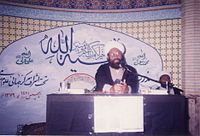 Addressing ulema and students at Madrasah Imam Ali Qom (May 2004).
Addressing ulema and students at Madrasah Imam Ali Qom (May 2004).
Principal of Dar-ul-Uloom Muhammadia
After returning to Pakistan in 1960, Pir Fazal Shah (Parhezgar) asked him to become the principal of Dar-ul-Uloom Muhammadia, Sargodha, which he eagerly accepted.[21]
In 1971, due to increased involvement in majalis and Shia political movements it became impossible for him to run the affairs of Dar-ul-Uloom Muhammadia, therefore he stepped down from this post.[22]Participation in Shia educational affairs
In 1963, the principals of Shia madrasahs from all over Pakistan gathered in Karbala Gamey Shah, Lahore, and founded Tanzeeme Madarise Arabia Shia Pakistan (Organization of Shia Madrasahs of Pakistan). Ayatollah Najafi was elected its president.
In 1965, a high-level organization of Shia ulema Mautamar Ulemae Shia Pakistan (Conference of Shia Ulema of Pakistan) was formed with Ayatollah Najafi as its president. and Mufti Jafar Hussain as its patron. Other members included Allama Gulab Ali Shah, Allama Akhtar Abbas, Allama Hussain Bakhsh Jarra, Hafiz Saifullah Jafari, Allama Syed Safdar Hussain Najafi, Mufti Inayat Ali Shah, Allama Muhib Hussain, Allama Riaz Hussain Najafi and Allama Ghulam Hassan Jarra.[23]Participation in Shia politics
In 1964, Ayatollah Muhammad Hussain Najafi played a pivotal role in gathering about 250 Shia ulema and leaders in Imam Bargah Rizvia, Karachi, where "Shia Mutalbat Committee" was formed with Syed Muhammad Dehlavi as its president.
In 1978, after Zia ul Haq's announcement of promulgating Hanafi fiqh, Shia ulema and leaders gathered in Bhakkar and founded Tehrik-e-Nifaz-e-Fiqh-e-Jafaria (later called Tehrik-e-Jafaria Pakistan) with Mufti Jafar Hussain as its president. Ayatollah Najafi was a part of this organization's supreme council. After Mufti Jafar's demise, it was upon Ayatollah Najafi's recommendation that Allama Arif Hussain Hussaini was elected the new president of the organization.[24]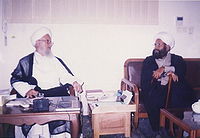 Meeting Grand Ayatollah Naser Makarem Shirazi (May 2004).
Meeting Grand Ayatollah Naser Makarem Shirazi (May 2004).
Jamia Sultan ul-Madaris
In 1978, Raja Mumtaz Ali Khan gifted 3-acre (12,000 m2) land to Ayatollah Najafi for madrasah, on which Jamia Ilmia Sultan ul-Madaris al-Islamia was constructed.
In 2004, he founded Jamia Aqeela bani Hashim for the religious education of women.
He is also the patron of the following madrasahs:- Madrasah Muhammadia, Sargodha
- Madrasah Ahya ul-Uloom Haideria, Mandi Bahauddin
- Madrasah Baqir ul-Uloom, Bhakkar
- Madrasah Wali ul-Asr, Jhang
- Madrasah Hazrat Amir ul-Momineen, Layyah
- Madrasah Jamia tul-Qaim, Layyah
- Madrasah Jafaria, Uch Sharif
- Madrasah Bab ul-Hussain, Dera Ismail Khan [1][25]
Burning of library
After the publication of "Tajalliat-e-Sadaqat", which was written in response to the anti-Shia book "Aftab-e-Hidayat", his family library was set ablaze by the opposite sect in Muharram 1983. He was in Quetta for reciting majalis of Muharram.[1][26][27]
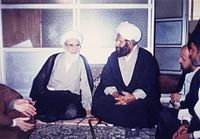 Meeting Grand Ayatollah Hossein Noori Hamedani (May 2004).
Meeting Grand Ayatollah Hossein Noori Hamedani (May 2004).
Participation in 17th Islamic Unity Conference, Tehran
On the invitation of the Iranian Supreme Leader Grand Ayatollah Ali Khamenei, he attended the 17th Islamic Unity Conference in Tehran, Iran in May 2004.
He also visited Hawza Elmiye Qom, where he had meetings with Ayatollah Morteza Moghtadai, Grand Ayatollah Hossein Noori Hamedani and Grand Ayatollah Naser Makarem Shirazi. He was interviewed by the state television and the Hawza Elmiye Qom's official magazine Hawza.Participation in 21st Islamic Unity Conference, Tehran
On the invitation of the Iranian Supreme Leader Grand Ayatollah Ali Khamenei, he attended the 21st Islamic Unity Conference in Tehran, Iran in May 2008, along with Allama Sajid Naqvi, Shaikh Mohsin Najafi, Hafiz Riaz Hussain Najafi and Maulana Sami ul Haq.
He also visited Hawza Elmiye Qom, where he had meetings with Ayatollah Jafar Subhani, Grand Ayatollah Mohammad Shahroudi, Grand Ayatollah Mousa Shubairi Zanjani, Grand Ayatollah Qorban Ali Kaboli, Ayatollah Ahmed Mobalighi and Grand Ayatollah Naser Makarem Shirazi. (Watch Online) He also addressed a gathering arranged in memory of Shaikh Aktar Abbas Najafi and Shaheed Ghulam Hussain Najafi in Madrasah Hojatieh, Hawza Elmiye Qom. (Watch Online)
Majalis and Q&A sessions
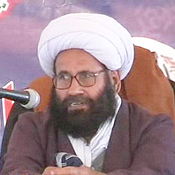 Addressing Muharram majlis in Multan (2009)
Addressing Muharram majlis in Multan (2009)
For past thirty years, he has been addressing majalis in almost all parts of Punjab, Pakistan. For the last five years he has been addressing majalis in Imambargah Shah Gardez, Multan where all the major Shia ulema address majalis before him, including Allama Akhter Abbas Naseem, Principal of Madrasah Jamia tus-Saqlain, Multan. Last year the famous Ayatollah Syed Aqeel-ul-Gharavi also addressed majalis at the same place.
He has also been addressing post-Muharram majalis in Islamabad and Birmingham, England for many years. (Watch 2009 Birmingham Majalis online) [28]After his majalis, questions pertaining to fiqh, aqaid and tafsir are put before him from the gathering. He gives answers to these questions with references from Quran and Hadith of The Fourteen Infallibles. At certain occasions, these Q&A sessions have spanned hours.[28]
Books
- Faizan ur-Rahman fi Tafsir ul-Quran
It is a 10-volume comprehensive Tafsir of Quran.[29][30]
- Masail ush-Sharia (Translation of Wasael ush-Shia)
It is the Urdu translation of the great Shia book of Hadith Wasael ush-Shia by Shaikh al-Hur al-Aamili. 13 volumes out of 20 have been published.[29][31]
- Kawakib-e-Muzayya (Translation of Al-Jawahar as-Sunnia fil-Ahadees-al-Qudsia)
It is the Urdu translation & explanation of Shaikh al-Hur al-Aamili's book on Hadith Qudsi.[32]
- Ahsan ul-Fawaid fi Sharh al-Aqaid
It is a 2-volume Urdu translation & explanation of Sheikh Saduq's famous Risala "Al-Aqaid". It contains all the Shia beliefs, and their truthfulness in the light of Quran and Hadith. (Read online)[29][33]
- Usool ush-Sharia fi Aqaid ush-Shia
This book discusses the beliefs of Ghali's, Tafwizi's and Shaykhi's (which they have spread in the name of Shia Islam), and negates them in the light of Quran and Hadith. (Read online)[29][34]
- Aitaqadat-e-Imamia
It is the Urdu translation & explanation of Allama Majlisi's "Risala tul-Lailia". (Read online)[29][35]
- Aqsam-e-Tauheed
- Mukhtasir Aqaid ush-Shia
- Qawaneen ush-Sharia fi Fiqh-e-Jafariya (Tawzih ul-Masail)
It is a 2-volume fiqhi book, covering all the aspects of human life according to Jafari Jurisprudence, including the modern human issues. The superiority of Jafari Jurisprudence over other Islamic Schools of Jurisprudence has been proved in the light of Quran and Hadith. (Read online)[29][36]
- Khulasa tul-Ahkam
It is an abridged version of Qawaneen ush-Sharia.[37]
- Hurmat-e-Ghina Aur Islam
This book discusses the hurmat of ghina in Islamic Sharia.
- Hurmat-e-Reeshtarashi
This book discusses the hurmat of shaving beard in Islamic Sharia.
- Namaz-e-Juma Aur Islam
It is a book proving that Juma Prayers are wajib even in Imam Mahdi's Ghaibat. It was published by Syed Muhammad Dehlavi in Karachi.[37]
- Iqd ul-Juma'n (Translation of Mafatih al-Janan)
Ayatollah Najafi translated Mafatih al-Janan during his stay at Najaf, but did not publish it as another translation was published from Lahore.
Grand Ayatollah Bazurg Tehrani has mentioned it in his famous book "Az-Zariya ila Tasaneef ush-Shia" (A list of Shia Books), and Grand Ayatollah Hussaini in his book "Ziyarat".[38][39]- Zaad-ul-Ibad li-youmil-Ma'ad
It is a collection of supplications from reliable Shia books.[29][38]
- Saadat ud-Darain fi Maqtal al-Hussain
It is a comprehensive account of the Battle of Karbala in 61 AH and the tragic martyrdom of Husayn ibn Ali, all narrated from reliable sources only. (Read online) [29][40]
- Faiz ur-Rehman (Translation of Lu'lu wal Marjan)
Ayatollah Najafi translated Allama Noori's famous book Lu'lu wal Marjan during his stay at Najaf, but did not publish it as another translation "Jawahir ul-Bayan" was published from Sargodha.
Grand Ayatollah Bazurg Tehrani has mentioned it in his famous book "Az-Zariya ila Tasaneef ush-Shia" (A list of Shia Books), and has written that its foreword about hurmat of ghina is indeed useful.[13][39]- Shuhda-e-Khamsa kay Haalat-e-Zindagi
It contains biographies of the five martyr Shia ulema:
- Shaheed-e-Awal Muhammad Jamal uddin Makki Amili
- Shaheed-e-Sani Zain uddin Amili
- Shaheed-e-Salis Qazi Nurullah Shustari
- Shaheed-e-Rabey Mirza Muhammad Kamil Dehlavi
- Shaheed-e-Khamis Mohammad Baqir al-Sadr[41]
- Isbat ul-Imamat
It is a book on the issue of Khilafat & Imamat, and establishes that Imam Ali was the true successor to the Prophet. (Read online)
Grand Ayatollah Bazurg Tehrani has mentioned it in his famous book "Az-Zariya ila Tasaneef ush-Shia" (A list of Shia Books).[29][35][39][42]- Tahqeeqat ul-Fariqain fi Hadis as-Saqlain
It is a book presenting extensive research from both the Shia & Sunni books of Hadith, as regards the truthfulness of Hadith of the two weighty things (Hadis as-Saqlain). (Read online)
Grand Ayatollah Bazurg Tehrani has mentioned it in his famous book "Az-Zariya ila Tasaneef ush-Shia" (A list of Shia Books).[29][35][39]- Tajalliat-e-Sadaqat fi Jawab Aftab-e-Hidayat
It is a 2-volume book in response to the anti-Shia book "Aftab-e-Hidayat" by Maulvi Karam Deen. (Read online)[29][43]
- Tanzeeh ul-Imamia amma fi Risala Mazhab ush-Sha
It is the book in response to the anti-Shia risala "Mazhab ush-Shia" by Pir Siyyalvi.[29]
- Khatm-e-Nabuwwat bar Khatmi Martabat
This book proves Khatme Nabuwwat (i.e. Prophethood has come to an end after Muhammad.)
- A'dab ul-Mufeed wal Mustafeed (Translation of Munia tul-Murid)
Ayatollah Najafi translated Shaheed-e-Sani's famous book Munia tul-Murid during his stay at Najaf, but did not publish it as another translation by Mufti Inayat Ali Shah was published.
Grand Ayatollah Bazurg Tehrani has mentioned it in his famous book "Az-Zariya ila Tasaneef ush-Shia" (A list of Shia Books).[39][41]- Islah ul-Majalis wal-Mahafil
This book discuss the wrong customs associated with majlis of Imam Hussain, and how to correct them.
- Islah ur-Rusoom az-Zahira ba Kalam al-Itrat at-Tahira
It is a comprehensive book discussing all the bid‘ah's and false customs in Islamic society, and how to correct them. (Read online)[29][44]
See also
- Marjas
- List of Marjas
- Mohsin Al-Hakim
- Mirza Javad Tabrizi
- Wasael ush-Shia
- The Five Martyrs
- List of Ayatollahs
- List of Shi'a Muslim scholars of Islam
- List of Shi'a books
- The Four Books
- Hawza
- Resalah
References
- ^ a b c d e f http://www.sibtain.org/urdu/biography.html
- ^ http://www.rissc.jo/
- ^ Hojatol Islam Tahir Abbas Qomi, Mard-e-Ilm Medan-e-Amal Mein, pp. 35-36
- ^ Hojatol Islam Tahir Abbas Qomi, Mard-e-Ilm Medan-e-Amal Mein, pp. 44
- ^ Hojatol Islam Tahir Abbas Qomi, Mard-e-Ilm Medan-e-Amal Mein, pp. 36
- ^ Hojatol Islam Tahir Abbas Qomi, Mard-e-Ilm Medan-e-Amal Mein, pp. 36-37
- ^ Hojatol Islam Tahir Abbas Qomi, Mard-e-Ilm Medan-e-Amal Mein, pp. 38
- ^ Hojatol Islam Tahir Abbas Qomi, Mard-e-Ilm Medan-e-Amal Mein, pp. 46-48
- ^ http://shareh.net/persian/magazine/hawzah/123/03.htm
- ^ حوزہ، شمارہ سوم، سال بیست و يکم، مرداد و شہریور 1383 , pp. 135-136
- ^ a b Hojatol Islam Tahir Abbas Qomi, Mard-e-Ilm Medan-e-Amal Mein, pp. 46
- ^ http://www.hawzah.net/hawzah/Magazines/Default.aspx
- ^ a b Hojatol Islam Tahir Abbas Qomi, Mard-e-Ilm Medan-e-Amal Mein, pp. 160
- ^ Grand Ayatollah Shaikh Bazurg Tehrani, Az-Zariya ila Tasaneef ush-Shia (A list of Shia Books), vol. 26 pp. 26 [1]
- ^ Grand Ayatollah Shaikh Bazurg Tehrani, Az-Zariya ila Tasaneef ush-Shia (A list of Shia Books), vol. 26 pp. 176 [2]
- ^ Aalulbayt Global Information Center, Musannifat-ush-Shia (Shia Books), vol. 5 [3]
- ^ Aalulbayt Global Information Center, Musannifat-ush-Shia (Shia Books), vol. 5 [4]
- ^ Hojatol Islam Tahir Abbas Qomi, Mard-e-Ilm Medan-e-Amal Mein, pp. 48
- ^ http://www.sibtain.org/books/risala/index13.html
- ^ http://www.sibtain.org/books/risala/default.htm
- ^ [Hojatol Islam Tahir Abbas Qomi, Mard-e-Ilm Medan-e-Amal Mein, pp. 37]
- ^ Hojatol Islam Tahir Abbas Qomi, Mard-e-Ilm Medan-e-Amal Mein, pp. 179-180
- ^ Hojatol Islam Tahir Abbas Qomi, Mard-e-Ilm Medan-e-Amal Mein, pp. 183-184
- ^ Hojatol Islam Tahir Abbas Qomi, Mard-e-Ilm Medan-e-Amal Mein, pp. 182-183
- ^ Hojatol Islam Tahir Abbas Qomi, Mard-e-Ilm Medan-e-Amal Mein, pp. 180-181
- ^ Maulana Syed Hussain Arif Naqvi,Tazkarae Ulemae Imamia Pakistan, pp. 322
- ^ Hojatol Islam Tahir Abbas Qomi, Mard-e-Ilm Medan-e-Amal Mein, pp. 50
- ^ a b Hojatol Islam Tahir Abbas Qomi, Mard-e-Ilm Medan-e-Amal Mein, pp. 175-176
- ^ a b c d e f g h i j k l m http://www.sibtain.org/urdu/publications.html
- ^ Hojatol Islam Tahir Abbas Qomi, Mard-e-Ilm Medan-e-Amal Mein, pp. 158-159
- ^ Hojatol Islam Tahir Abbas Qomi, Mard-e-Ilm Medan-e-Amal Mein, pp. 156-158
- ^ Hojatol Islam Tahir Abbas Qomi, Mard-e-Ilm Medan-e-Amal Mein, pp. 158
- ^ Hojatol Islam Tahir Abbas Qomi, Mard-e-Ilm Medan-e-Amal Mein, pp. 136-142
- ^ Hojatol Islam Tahir Abbas Qomi, Mard-e-Ilm Medan-e-Amal Mein, pp. 136-153
- ^ a b c Hojatol Islam Tahir Abbas Qomi, Mard-e-Ilm Medan-e-Amal Mein, pp. 154
- ^ Hojatol Islam Tahir Abbas Qomi, Mard-e-Ilm Medan-e-Amal Mein, pp. 155-156
- ^ a b Hojatol Islam Tahir Abbas Qomi, Mard-e-Ilm Medan-e-Amal Mein, pp. 156
- ^ a b Hojatol Islam Tahir Abbas Qomi, Mard-e-Ilm Medan-e-Amal Mein, pp. 159
- ^ a b c d e Grand Ayatollah Shaikh Bazurg Tehrani, Az-Zariya ila Tasaneef ush-Shia (A list of Shia Books)
- ^ Hojatol Islam Tahir Abbas Qomi, Mard-e-Ilm Medan-e-Amal Mein, pp. 159-160
- ^ a b Hojatol Islam Tahir Abbas Qomi, Mard-e-Ilm Medan-e-Amal Mein, pp. 161
- ^ http://vu.hadith.ac.ir/forum/default.aspx?g=posts&m=13687
- ^ Hojatol Islam Tahir Abbas Qomi, Mard-e-Ilm Medan-e-Amal Mein, pp. 155
- ^ Hojatol Islam Tahir Abbas Qomi, Mard-e-Ilm Medan-e-Amal Mein, pp. 162
Bibliography
- Grand Aytollah Bazurg Tehrani (1974–), Az-zareeya ila Tasaneef ush-Shia (A List of Shia Books), Hawza Elmiye Najaf, Iraq
- Aalulbayt Global Information Centre, Musaniffat-ush-Shia (Shia Books), Aalulbayt Global Information Centre
- Hojatol Islam Tahir Abbas Qomi (2006), Mard-e-Ilm Medan-e-Amal Mein, Jamia Wali-ul-Asr (Layyah, Pakistan)
- Maulana Syed Hussain Arif Naqvi, Tazkarae Ulemae Imamia Pakistan
- Maulana Riaz Hussain Jafari, Mayyar-e-Mawaddat (Ayatollah Allama Syed Muhammad Yar Shah Najafi ki Majalis ka Majmoo'a), Idara Minhas-us-Salehin (Lahore, Pakistan)
External links
- Official Website
- Biography
- "Tawzih-ul-Masail" online
- Read books online
- Watch videos of Majalis & Q&A Sessions
- Watch videos of 2009 Birmingham Majalis & Q&A Sessions
- Downnload Audio Majalis & Q&A Sessions
Categories:- 1932 births
- Living people
- Pakistani ayatollahs
- Shi'a clerics
- Shi'a Muslim scholars of Islam
- Pakistani clergy
- Pakistani Shi'a Muslims
- Jat people
- Punjabi people
Wikimedia Foundation. 2010.

